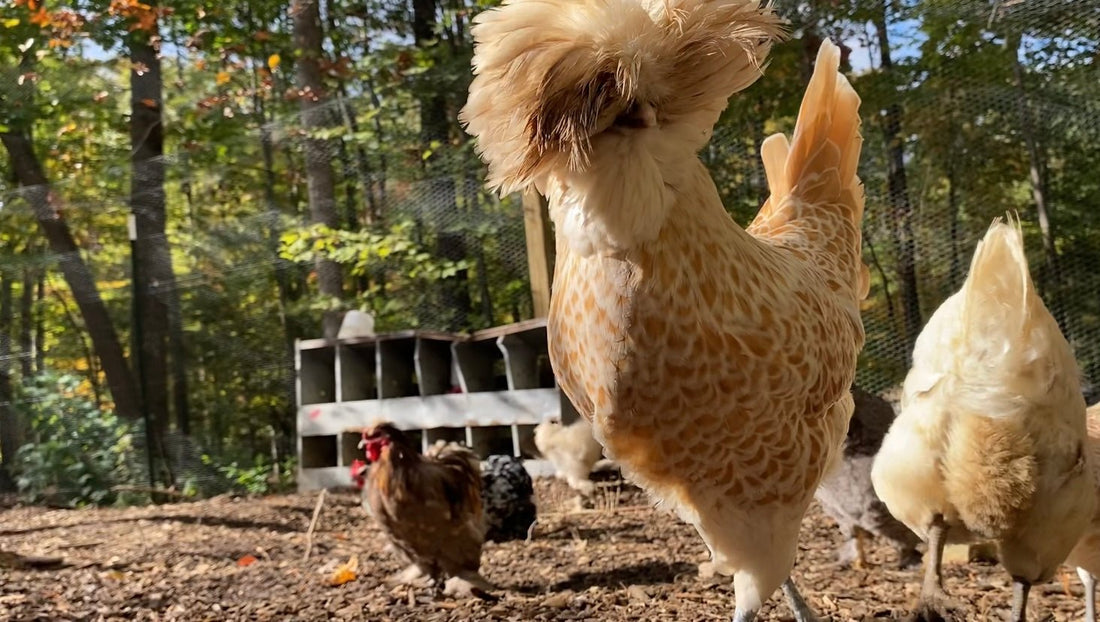Welcome to the fascinating world of Polish Chickens! Known for their striking appearance and playful personalities, these birds are more than just pretty feathers. We’ll explore the history, personality, appearance, egg production, and health and care needs of these unique chickens. Let's embark on this egg-citing journey together!
The Royal History of Polish Chickens Polish Chickens, despite their name, aren't actually from Poland. Their origins are somewhat of a mystery, with theories suggesting they originated in the Netherlands or Spain. The name "Polish" may have come from the Polish word 'pol', meaning 'head', referring to their distinctive crest of feathers.
In the 16th century, these birds were first mentioned in texts, indicating their presence in Europe. By the 17th century, they became popular across Europe, especially among the nobility, due to their exotic appearance. They reached American shores in the 1800s, capturing the hearts of poultry enthusiasts.
Personality Traits: The Charismatic Cluckers Polish Chickens are known for their delightful personalities. They are friendly, gentle, and often quite sociable, making them great pets. Their quirky nature, often attributed to their crested vision limitations, adds to their charm. They can be a bit skittish and are known for their amusing antics, which makes them entertaining companions.
Appearance: A Head-Turning Spectacle The most striking feature of the Polish Chicken is its large, fluffy crest of feathers atop its head. This crest can sometimes impair their vision, which adds to their endearing clumsiness. They have a v-shaped comb, and their bodies are compact and rounded.
Their feathers come in a variety of colors, including white, black, blue, and buff laced. This breed comes in both bearded and non-bearded varieties, with the beard consisting of a muff of feathers around the throat.
Egg Production: Not Just a Pretty Face While Polish Chickens are primarily kept for ornamental purposes, they are decent egg layers. They typically lay small to medium-sized white eggs. You can expect around 120-200 eggs per year from a healthy Polish hen. However, their egg production can be inconsistent, especially in winter months.
Health and Care: Keeping Your Polish Chickens Pristine
- Coop Considerations: Due to their crested feathers, Polish Chickens require a dry, clean coop to prevent feather fouling and infection.
- Protection from Predators: Their impaired vision makes them more susceptible to predators. Ensure their living space is secure and monitor their outdoor time.
- Feeding Finesse: A balanced diet is crucial. Alongside quality chicken feed, provide occasional treats like vegetables and mealworms.
- Health Checks: Regularly check their crest and eyes for signs of irritation or infection. Also, monitor for common poultry diseases and parasites.
- Social Needs: They enjoy the company of other chickens but watch out for bullying from more aggressive breeds.
The Unique Challenges of Raising Polish Chickens
Vision Impairment and Its Implications: One of the most distinctive features of Polish Chickens – their majestic crest of feathers – is also a source of their most notable challenge. This beautiful crest can often obstruct their vision, making them more prone to skittishness and anxiety. These birds might struggle to see predators, or even everyday objects and people, which can cause stress. Owners should consider trimming the feathers around the eyes to improve their line of sight.
Susceptibility to Weather and Environmental Conditions: Polish Chickens, with their elaborate feathering, are particularly sensitive to wet and muddy conditions. Their crests can easily become soiled, leading to potential skin irritation or infection. During rainy seasons or in particularly damp climates, extra care must be taken to ensure their living areas are dry and clean. Additionally, extreme cold can be a challenge as dampness in their feathers can lead to chilling or frostbite.
Dietary Needs and Nutritional Balance: While Polish Chickens have dietary requirements similar to other breeds, their unique physical characteristics necessitate extra attention to their nutrition. Ensuring a balanced diet is essential for maintaining the health and luster of their feathers. A lack of essential nutrients can lead to diminished feather quality, which is particularly problematic for a breed prized for its appearance.
Breeding Considerations: Breeding Polish Chickens can be more challenging than other breeds due to their crests. The crests can make mating difficult, as they can obstruct the rooster's vision and ability to perform mating rituals effectively. Breeding should be monitored to ensure the health and safety of both hens and roosters.
Social Dynamics and Integration: Integrating Polish Chickens into a flock with other breeds can be tricky. Their impaired vision can make them easy targets for bullying by more dominant birds. Ensuring a harmonious flock dynamic is crucial for their wellbeing. This might involve separate feeding areas or even a separate enclosure within a larger coop to prevent harassment from other chickens.
Grooming and Maintenance: Regular grooming is essential for Polish Chickens. Their crests and beards, if they have them, can collect dirt and debris. Regular cleaning and checks for lice, mites, and other parasites are essential. In addition, their nails and beaks may require more frequent trimming compared to other breeds due to their potentially reduced ability to naturally wear these down.
Behavioral Quirks and Training: Due to their limited vision and somewhat anxious nature, Polish Chickens may require more time and patience in training and handling. Gentle, consistent handling from a young age can help acclimate them to being around humans and reduce stress. They may also benefit from enrichment activities that are easily accessible and safe for them to engage with, considering their visual limitations.
Polish Chickens are more than just a beautiful breed; they're a delightful addition to any backyard or farm. Their quirky personalities, unique appearance, and the moderate egg-laying capabilities make them a favorite among poultry enthusiasts. Remember, with great beauty comes great responsibility! Providing proper care and attention will ensure your Polish Chickens thrive and bring joy to your life.

